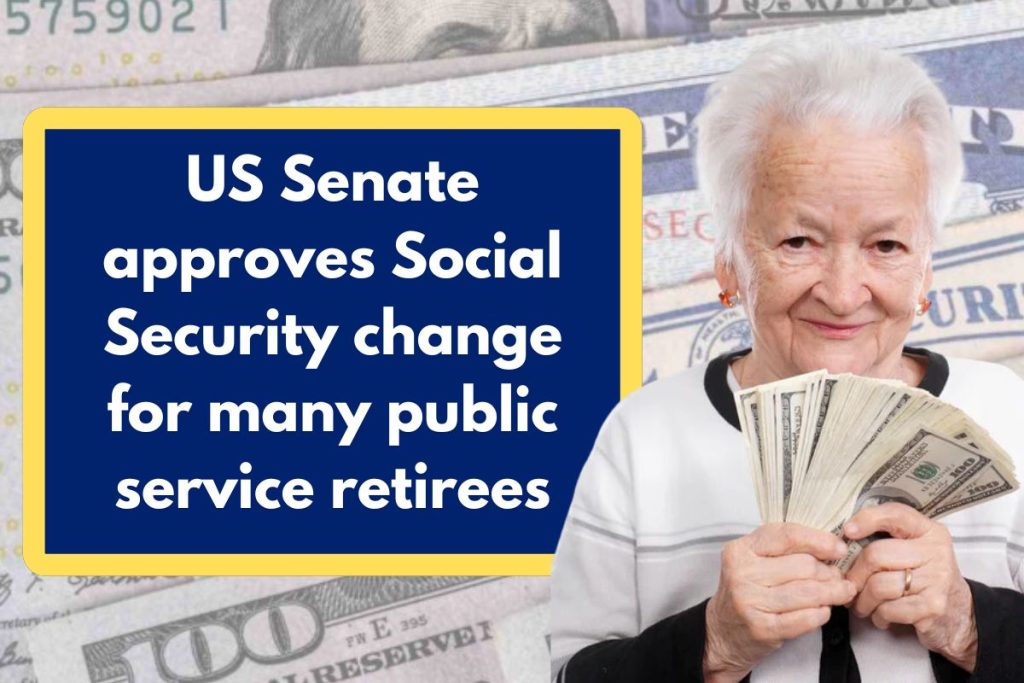In one of Congress’s final actions of the year, the Senate enacted legislation early Saturday to increase Social Security benefits for millions of individuals, advancing a long-standing goal for former public employees. The bipartisan bill, which will be presented to President Joe Biden next, will end long-standing cuts to Social Security benefits for about 3 million individuals who earn pensions from employment in public service positions such as teaching, firefighting, and law enforcement, as well as federal, state, and municipal government.
Proponents claim that the Social Security Fairness Act will address a long-standing inequity, but it will also further tax the Social Security Trust Funds. Despite decades of development, the campaign to approve the legislation culminated in the final weeks and minutes that members were in Washington before Congress reconvened the following year. The final vote was 76-20, with 27 Republicans and all Senate Democrats supporting the bill.
US Senate approves Social Security change for many public service retirees
Critics cautioned that the bill, which was enacted by the U.S. Congress early on Saturday, would further depress the program’s budget by increasing Social Security retirement payments to certain retirees who receive public pensions, such as retired firefighters and police officers. Shortly after midnight, the Senate passed the Social Security Fairness Act, a bipartisan vote of 76–20, repealing two decades-old restrictions that can lower payments for those who also receive a pension.
After passing the House of Representatives last month by a vote of 327 to 75, the bill will now go to Democratic President Joe Biden for his signature. A question regarding whether Biden planned to do so was not immediately answered by the White House.
What would this bill do?
- The bill will reverse a decades-old program modification that restricted government benefits to certain higher-paid employees who had pensions. Pay caps were eventually imposed on an increasing number of municipal workers, including postal workers and firefighters.
- Most Americans rely on their savings and Social Security instead of taking part in defined benefit pension plans. Approximately 10% of private sector employees in the United States have pension plans, according to data from the Labor Department.
- About 3% of Social Security beneficiaries, or little over 2.5 million Americans, are impacted by the new requirements. These workers and retirees are important constituency for lawmakers, and their influential advocacy groups have lobbied for a legislative resolution.
- The law might result in some of them receiving hundreds more dollars each month in government benefits, according to retirement experts. The nonpartisan Congressional Budget Office estimated that the plan would cost about $196 billion over the next ten years, which some government budget experts worried might negatively impact the program’s already precarious finances.

Social Security Fairness Act – Is Now Approved
A bill that would boost Social Security benefits for millions of public sector workers was forwarded to President Joe Biden for his signature after it was widely approved by the Senate. It was passed by a vote of 76–20.
A discharge petition, a procedural mechanism used by rank-and-file lawmakers to force a floor vote without the approval of House GOP leaders, allowed it to pass the House in November in a resounding bipartisan vote of 327-75. If enacted, the bill would allow public sector employees who also receive pensions to receive Social Security payments.
Senate passes bill, sending it to Biden
- The bipartisan bill, which will be presented to President Joe Biden next, will end long-standing cuts to Social Security benefits for about 3 million individuals who earn pensions from employment in public service positions such as teaching, firefighting, and law enforcement, as well as federal, state, and municipal government.
- Supporters claim that the Social Security Fairness Act will address a long-standing inequity, but it will also further tax the Social Security Trust Funds. Although the legislation has been in the works for decades, the final weeks and hours that lawmakers were in Washington before Congress reconvened the next year saw the conclusion of the drive to pass it.
- 23 Republicans and all but one Senate Democrat backed the effort to put it to a Senate final vote. The vote was 76-20 in the end. However, the Congressional Budget Office estimates that such higher payments would also result in an additional $195 billion in federal deficits over a ten-year period.
- According to estimates, SSTF will not be able to pay out full payments starting in 2035. This adjustment will accelerate the program’s bankruptcy date by approximately six months. The nonpartisan Committee for a Responsible Federal Budget estimates that the benefits of a traditional dual-income couple retiring in 2033 would be reduced by an additional $25,000 throughout their lifespan.
- Despite acknowledging that the existing reductions are unfair to public sector retirees, several opponents of the bill stated that they could not support the bill at a time when the entire program is facing difficulties. Additionally, the Social Security Administration, which currently has the lowest staffing level in 50 years, will have to shoulder more work as a result of the policy changes
| Official Website | Click Here |
| Our Homepage | BSEBMatric.org |